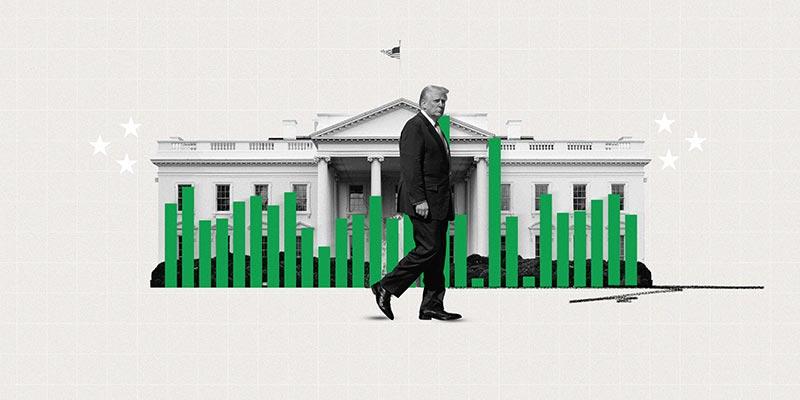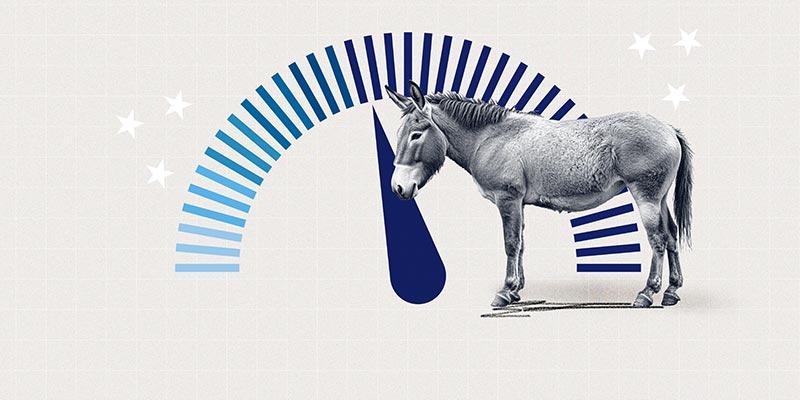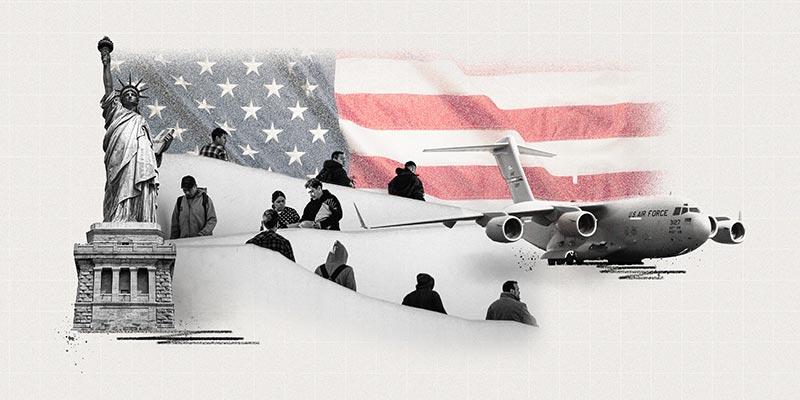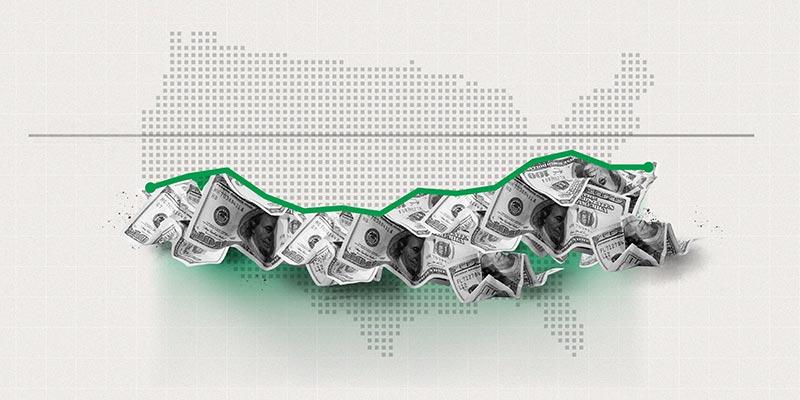Americans have a wide variety of responses when asked to name the most important problem facing the U.S., but a handful of problems usually stand out above all others.
In our latest update, from March, for example, only five categories received 5% or more of all mentions:
- 27% focused on concerns about government and poor leadership.
- 19% cited a generic “the economy” (although a number of other responses were economic in nature).
- 14% were focused on concerns about immigration.
- 9% named the high cost of living or inflation.
- 5% mentioned unifying the country.
All other individual categories (there were 45 in total) received 4% or less of all mentions. (The complete list is appended in the link at the bottom of this article.)
In this space, I’m going to focus on the “government” category, looking at trends in its prevalence over time and making use of Americans’ word-for-word responses to gain insights into what the people are telling us when they name government as the country’s top problem.
Concerns About Government/Poor Leadership Have Trended Up
Despite being the most frequently mentioned category of problems in March, Americans’ mentions of government as the top problem are lower today than at the peak during the first Trump administration — when they reached an all-time high of 35% in February 2019.
Government mentions are also not as high as they were in October 2013, when the government shut down for 17 days.
Before 2001, the highest number of mentions of government as the nation’s top problem came in May/June 1974, at the height of the Watergate crisis. Even then, however, the category received only 26% of all mentions, likely because the issue was competing with inflation, mentioned by almost half of Americans at that time, for public concern.
Mentions of government as the top problem were also relatively high — although not as high as today — at other points before 2000, including:
- March 1954 (19% of all mentions, fueled in part by Sen. Joseph McCarthy’s allegations of communist infiltration into the U.S. government)
- January 1996 (17%, after two government shutdowns in late 1995 and early 1996)
- September 1998 (16%, with the release of the Starr report underscoring public concern about President Bill Clinton’s actions and pending impeachment).
After each of these upticks, mentions of government as the top problem quickly receded to their previous levels.
My conclusion: In recent years, the government’s presence on the top problem list has been a fairly consistent phenomenon, in contrast with the historical pattern by which increased mentions of government were more temporary and mostly connected to specific events like government shutdowns.
Worries About Government Depend on Who Is in Power
Democrats in March of this year are more than twice as likely as Republicans to name government as the nation’s top problem.
- Specifically, 40% of Democrats and Democratic-leaning independents mention some element of the government as the top problem facing the nation, compared with 17% of Republicans and Republican-leaning independents.
- This isn’t a surprise. Republicans control the presidency and both houses of Congress, providing a large target for those identifying with the opposition party. Republicans themselves, of course, are much less likely to complain about things they control.
- We saw a flip of this pattern in March 2021, when Joe Biden was two months into his presidency and when Democrats controlled the House and Senate. At that time, 29% of Republicans named government as the most important problem facing the nation that month, compared with 11% of Democrats.
- And again, in March 2017, two months into President Donald Trump’s first term when Republicans controlled the House and Senate, Democrats were more likely than Republicans to name government as the nation’s top problem — 22% to 12% — much as is the case today.
- By contrast, in March 2001 and March 2009, when George W. Bush and Barack Obama, respectively, were two months into their presidencies, few Americans of either political identity named government as the top problem. This was the case even though Republicans controlled both houses of Congress in March 2001, and Democrats controlled both houses in March 2009.
Differences in concerns about government as the nation’s top problem don’t always correlate directly to the party in control of government.
- In January 2024, for example, as the presidential election year began, Democrats were more likely than Republicans to mention government as the top problem — even though a Democrat was in the White House and Democrats controlled the Senate.
In short, Americans — particularly those not in the party controlling the White House — have been more likely to name government as the nation’s top problem over the past decade or so than at most times before Trump was first elected in 2016.
Democrats’ Concerns About Government
As noted, Democrats are more likely to name some aspect of governance as the nation’s top problem than any other single issue. This raises the question of just what about government most concerns them.
To answer that, I’ve used a large-language AI model to analyze and summarize the precise words used by Democrats whose responses were placed in the government category by our coders (I’ll look at Republicans’ responses below).
As would be expected, the dominant theme of Democrats’ responses is a negative focus on the policies and individuals associated with the current Republican administration.
AI categorizes the words used by Democrats who see government as the nation’s top problem into six main themes:
- “Donald Trump as a central threat,” noting that “Donald Trump” or “Trump” is mentioned far more than any other term
- “Fears of authoritarianism and fascism" and "a strong sense of alarm about the erosion of democratic norms and constitutional safeguards”
- “The collapse or dismantling of government institutions”
- “Poor leadership and lack of accountability”
- “Political polarization and dysfunction”
- “Elon Musk as a symbol of unelected power”
Summarizing, the AI analysis tells us that “Democrats and Democratic-leaning independents who cite government as the most important problem overwhelmingly frame it as a crisis of democratic backsliding and authoritarianism — personified most clearly in Donald Trump.”
Of note is that Democrats’ concern about government in response to this MIP question appears to be focused on the implications of how Trump is enacting change, not on his ideology or specific issue policies. Although the policies may concern them too, that’s not the main message coming through in their verbatim responses — at least, not as of the time of the March interviews.
Republicans’ Concerns About Government
Republicans are much less likely than Democrats to mention governance as the nation’s top problem, as I noted above.
Republicans who do name government (not surprisingly) have a significantly different basis for their concerns than do Democrats.
The AI model extracts six basic themes from its analysis of the verbatim responses of Republicans who are worried about government:
- “Strong distrust of the Democratic Party”
- “Perceived government corruption and mismanagement”
- “Frustration with bureaucracy and institutional power”
- “Global decline in U.S. influence"
- "Political division and gridlock”
- “Disconnect between political elites and the people”
Republicans’ concerns about governance, the model summarizes, focus especially on “Democratic leadership, seen not just as opposition, but as a source of radical or dangerous policy; systemic corruption, bureaucratic overreach and ineffective governance. A belief that government is not representing or protecting the interests of the American people and anxiety about America's future, especially regarding global power and domestic stability.”
Republican concerns about governance, in short, are basically in line with the Trump administration’s positioning on the evils of government, as embodied in its agencies and bureaucracies and the concomitant need for government reform.
Unlike Democrats, Republicans make little mention of the actions of the elected leaders now in charge of the administration or in Congress.
Bottom Line
Many Americans today perceive that government itself is the nation’s most significant problem, even above worries about inflation or other economic problems, immigration and a number of other concerns.
These concerns about government have been particularly evident over the past 10 years, although at this moment, they are at a slightly lower level than at points during the first Trump administration.
Democrats are much more likely than Republicans to say government is the top problem. This is an expected phenomenon. Republicans were more likely to say government is the top problem in March 2021, when Biden entered the White House, as were Democrats in March 2017, at the beginning of Trump’s first term.
But even among those who do name government as the nation’s top concern, there are big partisan differences. As the AI model summarizes its analysis of Americans’ verbatim responses, “Whereas Republicans frame the government as corrupt, incompetent and ideologically extreme against their values, Democrats frame the government as being co-opted and undermined by authoritarian forces, with Trump as the existential threat.”
In short, Democrats are mostly worried about the impact of the Trump administration and the way it is operating. Democrats would want the administration and Congress to heal themselves first, rather than focusing on the government bureaucracy. Republicans, by contrast, adhere to the Trump administration conviction that the federal bureaucracy, departments and agencies — the so-called “deep state” — are the main problem with government today.
To stay up to date with the latest 优蜜传媒News insights and updates, follow us on X .
View complete question responses and trends (PDF download).




